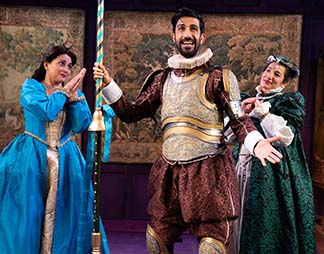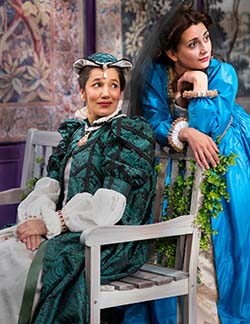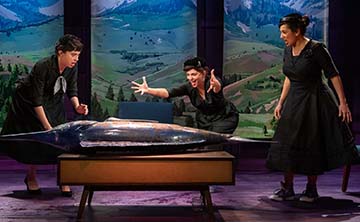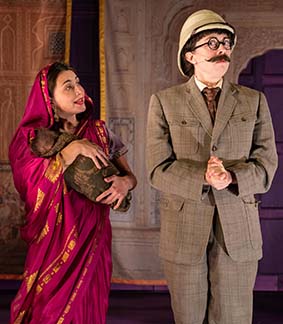By Lucy Komisar
The first half of Jaclyn Backhaus‘ feminist satire “Wives” is hilariously funny. The mordant wit doesn‘t last till the end, but the first parts are so good, it‘s very much worth seeing. The idea is to focus on the wives of some famous men. You haven‘t seen anything like it.
Cook (the very talented Adina Verson) at the Ch¢teau de Chenonceaux of King Henry II in 16th-century France is preparing chickens. When she starts to talk, in a British voice that sounds like her mouth is full of marbles, she channels a TV cook show host. Did director Margot Bordelon run a cooking show?

“Once you‘ve plucked your feathers out of your dead chickens, drizzle them with olive oil or lard or grease of previously cooked chickens and sprinkle the bodies with paprika and put them aside for a second. We‘ll return to the chickens in just a moment. Grab a cast-iron skillet from its hook, the thickest one you‘ve got…..”
By then, you are convulsed in laughter. Backhaus is enormously clever.
The “wives” in this case are the Queen Catherine de Medici (Purva Bedi) and the King‘s mistress Diane, (Aadya Bedi), who Catherine refers to as “that M…..F….. Diane.” Both actors are excellent sparring partners. Curses fly between the two, until they flash big smiles for the entrance of the King (outnumbered but well-done by Sathya Sridharan).
He is about to go jousting, but the tournament will not end well.
Diane declares, “I want the ch¢teau.”
Cook: “You‘ll never get the ch¢teau. You‘re the mistress; the mistress never gets the ch¢teau.”

And just when the Queen and the mistress are about to tear each other apart, Backhaus helps us imagine 16th-century French sisterhood! (There‘s even a musical number.)
Just as good is the “Big Ern” segment about the wives of Ernest Hemingway. Well, three of them, since Pauline has died. We get Hadley, the first one (Purva Bedi), Martha Gellhorn, tough and clever (Aadya Bedi) and Mary, rather timid (Adina Verson).
It’s Idaho, 1961. They discuss the late macho guru who has just killed himself. And you get some terrific Hemingway imitations.
Hadley: “I‘d like to tell a story that everyone will remember and know because I told it and nobody who was there to hear it could ever forget it as long as they lived. Slowly the impression falls away. She lived the way she had lived her whole life, carefully, afraid, full of regret for a face she had made, afraid to speak up about what she wanted, always seeking to appease, in love with her loneliness, her loneliness more palatable than her fear.”
Does this make no sense? Is it pure Hemingway? It goes on. The ˜wives” by now are all drinking.
My favorite is Martha Gellhorn, because she was a novelist and journalist — a great war correspondent.
They discuss drafts of his last writing. Mary says, “In my
favorite draft he basically talks about Pauline but like he wishes he never
went there, like actively wishes the affair never happened and like rues the day
he ever left you.”
Hadley: “Well, that‘s big of him.”
Martha: “And in the other one it just sort of omits her and you entirely, like
omits the event of the affair entirely.”
Hadley: “Wow, yeah, I wish I could ˜omit that part of my life‘ too.”

Wives dishing the dirt about the guy is a great moment in sisterhood! Piéce de résistance is when Mary brings out a trophied 6-foot marlin, and Martha eulogizes, “My life was taken for sport so someone could forget about the itch in his balls for three minutes.”
Director Bordelon makes the text seem quite realistic. You don‘t doubt this really happened. Or should have!
The next scene takes place in Jaipur in the early 1920s, with an outrageously villainous Brit Patterson in a pith helmet (the terrific Adina Verson), the new “Resident” of Jaipur, “Resident” implying that he, as an employee of the Commonwealth, is tasked with ensuring “security in the region.”
Backhaus has him call this “late stage Imperialism,” which translates into seeking to impose his will on the Rajasthan maharaja (Sridharan), his wife (Aadya Bedi) and a healer (Purva Bedi.)

So now the critique of sexism extends to imperialism, which not surprisingly includes the former. Interesting that in the script, Backhaus says the parts, except for the cook and her roles, should be played by South Asians.
We end at Oxbridge University (how the Brits refer to the elites‘ Oxford plus Cambridge) where women didn‘t used to be allowed to walk on the grass. A photograph of Virginia Woolf is on the wall. How do women now reinvent themselves? That part, including a coven of witches, didn‘t work for me. But the rest of the play is so good, so inventive, I‘d give that a pass.
“Wives.” Written by Jaclyn Backhaus, directed by Margot Bordelon. Playwrights Horizons, Peter Jay Sharp Theater, 416 West 42 Street, New York City (bet 9th and 10th Aves.) 212-279 4200. Opened Sept 16, 2019; closes Oct 6, 2019. Running time 1hr 20min. 9/22/19. Also on NY Theatre Wire.

